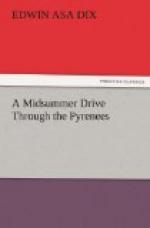But evidently it is we who are the chief curiosity,—not they. The dresses of the ladies are unobstrusively but openly admired,—gloves and hat-pins discussed in detail, in an unintelligible patois. I inquire how many people there are in the village; what they find to do; whether they are not lonely, so far from the world. They answer my queries in unconfused French, speaking both this and their patois, and even ask respectful questions in turn. There are about seventy people who live here, they say, but most of them are away in the fields during the day; the women at home weave silk, to be taken to the valley for sale. They are nearly all related by marriage (allies) or by blood to each other; they are governed by a little council of old men; there is no chief, nor anyone superior to the authority of the council; it regulates the duties of each. They know of no taxes of any kind to pay; they always marry within the village, except where the patriarchs may grant a dispensation with an outsider; yes, they have many old people here, one or two very old indeed, though none so old as a hundred and sixty-three,—the age of King Henry’s ancient pensioner.
But the other questions we put are too large or too novel to grasp. They do not apparently know what I mean by being lonely. The conception has never occurred to them. Nor do they think they are far from the world. They go down to the valley beneath, at times, they tell us; and on feast-days and for the rustic August dances they have even been to Laruns; the men cross the Gourzy to Eaux Bonnes, and they have all often heard long descriptions of Cauterets and Pan.
The interest of our hostesses in their unwonted visitors is manifestly as great as ours in them, and there is a curious zest in gratifying it. Yes, we are traveling in France; we have come from America to travel; we have been to Pau and Eaux Bonnes, and are going on to Cauterets and through other parts of the Pyrenees,—it was a bold undertaking! They do not find a reason for it at all. One of them is familiar with America, she says, for she once knew of some one who went there—to Buenos Ayres. They are well-intentioned and free and happy, and never think of envy as they query these cometary strangers.
The camera focuses their wonder. We show them the reflections on the ground-glass,—the houses, the waving leaves, each other’s faces. It is incredible! We open the box and explain the structure of the monster. Finally we boldly ask for a sitting, and after some urging and bashful demurring, these belles and dames of Goust coyly group themselves by a felicitous doorway, and—veritable “flies in amber”—are perpetuated for posterity.




